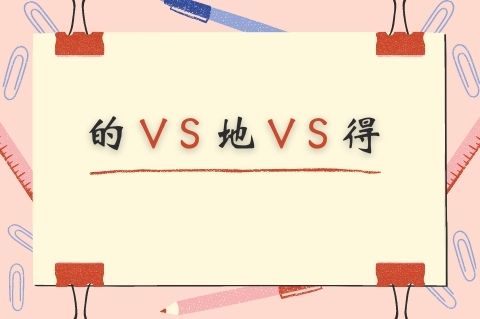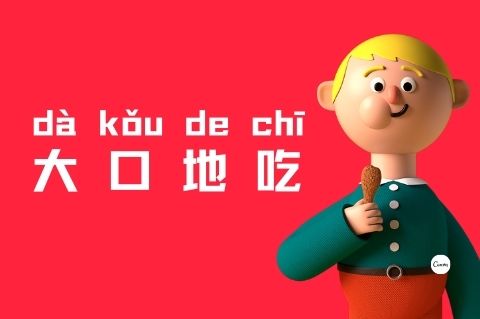While learning Chinese, you’ve more likely than not come across these three words: “的”, “得” and “地” – all pronounced “de”. These three characters are like three brothers, and they often pop up in our lives. Although they have the same pronunciation, their different looks come with different usages. Many Chinese students mix them up, so today we’re going to set things straight by looking at the simple rules they actually use.

Use “的” in front of nouns.
例如:
美味的烧烤 (měi wèi de shāo kǎo): delicious barbecue
明亮的窗户 (míng liàng de chuāng hu): bright window
清晰的画面 (qīng xī de huà miàn): clear picture
宽敞的房间 (kuān chǎng de fáng jiān): spacious room
乌黑的头发 (wū hēi de tóu fa): black hair

Use “地” before verbs.
例如:
大口地吃 (dà kǒu de chī): to gulp; to eat with big mouthfuls
轻松地阅读 (qīng sōng de yuè dú): to read softly
快速地做题 (kuài sù de zuò tí): to do questions quickly
仔细地打扫 (zǐ xì de dǎ sǎo): to clean carefully

“得” is preceded by a verb that is modified by the following adjective.
例如:
吃得香 (chī de xiāng): to eat something delicious
跑得慢 (pǎo de màn): to run slowly
买得多 (mǎi de duō): to buy a lot
学得快 (xué de kuài): to learn quickly

的: Generally used in front of the subject and object.
Words in front of “的” are generally used to explain those behind “的” by modifying or limiting them.
例如:
yí hé yuán ( míng cí )de hú guāng shān sè ( zhǔ yǔ )měi bú shèng shōu.
颐和 园 (名 词) 的 湖 光 山 色 (主 语) 美 不 胜 收。
The lakes and mountains [Noun] of the Summer Palace [Subject] are beautiful.

地: Generally used in front of predicates (verbs, adjectives).
Words in front of “地” are generally used to explain what the actions behind the “地” are and their results.
例如:
tā yú kuài ( xíng róng cí )de jiē shòu ( dòng cí , wèi yǔ )le zhè jiàn lǐ wù.
她 愉 快 ( 形 容 词 ) 地 接 受 ( 动 词, 谓 语) 了 这 件 礼 物。
She accepted [Verb/Predicate] the gift happily [Adjective].

得: Generally used after the predicate.
Words after “得” are generally used to modify the action before “得”.
例如:
tā men wán( dòng cí , wèi yǔ ) de zhēn tòng kuài( bǔ yǔ ).
他 们 玩( 动 词, 谓 语) 得 真 痛 快 ( 补 语)。
They play [Verb/Predicate] delightedly [complement].


Please select the appropriate word to fill in each blank.
A. 的 (de)
B. 地 (de)
C. 得 (de)
1. jiān dìng de huí dá
坚定______ 回答
2. hóng sè de qì qiú
红色______ 气球
3. xiào de kāi xīn
笑______ 开心
4. zǐ xì de guān chá shuǐ liú hé dì xíng.
仔细______ 观察水流和地形。
5. tiāo qǐ mǎn mǎn de yī dàn liáng shi.
挑起满满______ 一担粮食。
6. xì shā bān de chūn yǔ qīng róu de sǎ zài mài tián lǐ,nóng mín men gāo xìng de shǒu wǔ zú dǎo qǐ lái.
细纱般______春雨轻柔______洒在麦田里,农民们高兴______手舞足蹈起来。
“Do You Believe Every Chinese Idiom Has 2 Sides?”
“Clearing Up Confusion Surrounding Some Confusing Phrases”
”Expressing Degrees of Willingness”




